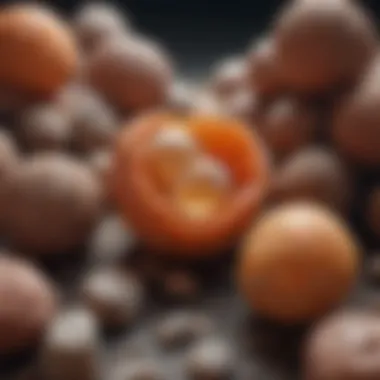Stevia and Kidney Stones: Exploring the Link


Intro
The relationship between dietary choices and physiological health outcomes has been a subject of extensive research. Stevia, a natural sweetener derived from the leaves of the Stevia rebaudiana plant, has gained popularity as a sugar alternative. Some individuals express concern about the potential health implications of stevia consumption, particularly related to kidney issues. Kidney stones, a common urinary tract problem, affect millions worldwide. Understanding the intersection of stevia and kidney stone formation becomes crucial for patients and health professionals alike.
This article aims to unravel the connection between stevia consumption and kidney stone development, addressing various aspects impacting this relationship.
Methodologies
To effectively explore the relationship between stevia and kidney stone formation, it is essential to utilize various research methodologies that provide robust data and insights.
Description of Research Techniques
Multiple approaches are employed to investigate the safety and metabolic effects of stevia. Laboratory studies often look at animal models to assess how stevia interacts with kidney function. In addition to this, epidemiological studies analyze dietary intake patterns among different populations. These studies help identify any significant correlations between stevia consumption and the incidence of kidney stones.
Tools and Technologies Used
Modern research employs advanced analytical techniques to gather data. Spectroscopy is one such tool that allows researchers to identify chemical compounds in processed stevia. Additionally, software like SPSS and R are used for statistical analysis, providing insights into the relationships between stevia intake and kidney health outcomes.
Discussion
Comparison with Previous Research
Previous studies assessing stevia's safety and health effects presented varied conclusions. While some reveal it to have negligible effects on kidney function, others indicate potential pathways that may lead to stone formation. Comparing these findings with more recent research helps clarify whether stevia significantly affects predisposed individuals.
Theoretical Implications
Understanding the biochemical pathways through which stevia may influence kidney health is paramount. Should future studies establish a link between stevia and increased kidney stone risk, it could necessitate revisions in dietary recommendations for at-risk populations. Such theoretical implications underscore the critical nature of further research.
"Identifying the precise effects of dietary components on health can guide nutritional policy and individual choices."
Foreword to Stevia
Understanding stevia is crucial in exploring its potential effects on kidney stone formation. Stevia is not only a natural sweetener but also presents unique biochemical properties that can influence health. This section will delve into what stevia is, how it has been used historically, and why it has gained popularity in today's diets. Each of these elements contributes to a broader understanding of its safety and relevance in nutritional discussions.
What is Stevia?
Stevia, scientifically known as Stevia rebaudiana, is a plant native to South America. This plant is renowned for its leaves, which contain compounds called steviol glycosides. These compounds are responsible for stevia's sweet taste. Unlike regular sugar, stevia has no calories, making it appealing for those looking to reduce their sugar intake. Its sweetness can be significantly stronger than that of sucrose, sometimes 50 to 300 times sweeter. This potency means that only a small amount is needed to achieve the desired sweetness.
Historical Use of Stevia
Historically, stevia has been utilized for centuries by indigenous cultures in Paraguay and Brazil. The Guaraní people have employed stevia for its sweetening properties long before it became popular in Western countries. They used it in various food and beverages, appreciating its natural flavor without the calories associated with sugar. However, stevia's path to approval as a food additive was not straightforward. During the late 20th century, some health concerns led to its temporary ban in several countries, particularly in the United States. Today, stevia is recognized as safe by numerous food safety authorities.
The Popularity of Stevia in Modern Diets
The surge of interest in stevia within modern diets stems from growing health consciousness. With increasing rates of obesity and diabetes, many are seeking alternatives to sugar. Stevia stands out as a natural option devoid of calories and carbohydrates. Food products that incorporate stevia often promote themselves as healthier choices. These include beverages, snacks, and sauces. Furthermore, the rise of the health and wellness trend among consumers has led to a higher demand for natural sweeteners. This trend has spotlighted stevia as a favorite among those practicing low-carb or ketogenic diets.
Understanding Kidney Stones


Understanding the formation and implications of kidney stones is vital in the context of assessing stevia consumption's effects on renal health. Kidney stones can cause severe pain and lead to various complications, including infections and potential kidney damage. Knowing how stones form helps clarify whether dietary choices, such as the inclusion of stevia, could play a role in mitigating or exacerbating risks. This section discusses the definitions, types, contributing factors, and dietary roles concerning kidney stones.
Definition and Types of Kidney Stones
Kidney stones, medically termed nephrolithiasis, are hard deposits made of minerals and salts that form inside the kidneys. These stones vary in size, ranging from a few millimeters to several centimeters and can be categorized into different types based on their composition:
- Calcium Stones: The most common type, typically made of calcium oxalate or calcium phosphate.
- Struvite Stones: Often associated with urinary tract infections, these stones consist of magnesium ammonium phosphate.
- Uric Acid Stones: These stones form when urine is too acidic, often linked to high-protein diets.
- Cystine Stones: Resulting from a genetic disorder causing excessively high levels of cystine in the urine.
Each type of stone has unique formation mechanisms and dietary considerations, emphasizing the importance of understanding dietary impacts on kidney health.
Factors Leading to Kidney Stone Formation
Several factors contribute to kidney stone development, including:
- Dehydration: Low fluid intake can concentrate minerals in urine, increasing the likelihood of stone formation.
- Dietary Choices: High intake of sodium, oxalate-rich foods, and animal proteins can elevate risks.
- Obesity: Higher body weight can lead to alterations in urine composition, raising stone risk.
- Medical Conditions: Certain health issues, such as diabetes and gout, can predispose individuals to stone formation.
Such factors illustrate why it is necessary to consider lifestyle and dietary habits to prevent kidney stones effectively.
The Role of Diet in Kidney Health
Diet plays a crucial role in maintaining kidney health and preventing stone formation. Specific dietary recommendations can help manage risks associated with kidney stones. Some important considerations include:
- Fluid Intake: Hydration is essential; drinking sufficient water dilutes urine and helps prevent stone formation.
- Balanced Nutrition: Consuming a balanced diet rich in fruits, vegetables, and whole grains supports overall kidney health.
- Limiting Certain Foods: Reducing oxalate-rich foods, like spinach and nuts, and minimizing salt intake can decrease stone risk.
- Dietary Supplements: Some individuals may benefit from calcium and magnesium supplements to prevent stone formation, as this can help maintain better mineral balance in urine.
In summary, understanding kidney stones involves recognizing their types, formation factors, and the significant impact of dietary choices. This insight is crucial for those considering stevia as a sweetener, helping evaluate its effects on kidney stone risks.
Biochemical Impacts of Stevia on the Body
Understanding the biochemical impacts of stevia on the body is vital to examining its relationship with kidney stone formation. The interactions between stevia and bodily functions can reveal how its consumption may influence overall kidney health. Recognizing these impacts helps in evaluating whether people with predispositions to kidney stones should consume stevia or if they should consider alternatives.
Stevia’s Metabolism and Excretion
Stevia consists primarily of steviol glycosides, which are natural compounds that provide its sweet taste. When ingested, these glycosides undergo metabolism in the human digestive system. They are converted into steviol, a compound that is then absorbed into the bloodstream. This transformation is crucial because steviol does not raise blood glucose levels, making stevia a safe option for individuals managing their blood sugar.
After absorption, steviol is primarily excreted via urine. This pathway is significant because it indicates how stevia may affect kidney function. Healthy renal activity is necessary to filter waste substances and to maintain electrolyte balance. High stevia intake should not overwhelm the kidneys under normal conditions but leads to questions about long-term use, especially in those with existing health issues.
Potential Influences on Mineral Absorption
The interaction between stevia consumption and mineral absorption is an area of emerging interest. Some studies suggest that certain sweeteners can hinder the absorption of vital minerals such as calcium and magnesium. This is important because deficiencies in these minerals may contribute to kidney stone formation, particularly calcium oxalate stones.
Research regarding stevia's specific impacts on mineral absorption is not fully conclusive. While anecdotal evidence exists, controlled studies are limited. Resolving this uncertainty can assist individuals in making informed decisions regarding stevia intake as part of their diet, especially for those monitoring their kidney health.
Renal Function and Sweeteners
The overall effect of sweeteners on renal function remains a topic of ongoing research. Some artificial sweeteners have been associated with adverse kidney effects, raising concerns about their safety in large quantities. In contrast, stevia is generally regarded as a safer alternative. Understanding how different sweeteners, including stevia, affect kidney function is integral in determining the sustainability of their long-term use for kidney health.
Moreover, individual factors such as pre-existing conditions, dietary habits, and hydration levels can further complicate the relationship between sweeteners and kidney health. For instance, those with preexisting renal issues should consult health professionals before increasing stevia consumption.
Continued exploration of the biochemical effects of stevia is necessary to understand its implications for long-term health profoundly.


In summary, while stevia presents metabolic benefits, its influence on mineral absorption and renal function needs further examination. This understanding aids in comprehensively evaluating the potential relationship between stevia consumption and kidney stone formation.
Research on Stevia and Kidney Stones
The relationship between stevia consumption and kidney stones is a significant area of study, especially as the use of stevia as a sweetener continues to rise in popularity. Understanding this connection informs both dietary choices and health implications, particularly for individuals at risk for kidney stones. Researchers are focused on how stevia might interact with dietary patterns and metabolic processes that could influence kidney stone formation. This exploration allows consumers to make informed decisions about including stevia in their diets, considering its potential impact on health.
Current Scientific Findings
Recent scientific studies have started to shed light on how stevia affects kidney health. Some research suggests that stevia does not have a direct association with increased kidney stone risk. For instance, a study published in the Journal of Medicinal Food indicated that stevia might have protective properties for kidney function.
In this context, it appears that stevia can help modulate urinary conditions that typically lead to stone formation. Research on the intake of stevia and its metabolites show that they do not significantly alter urinary calcium or oxalate levels, which are critical factors in kidney stone development.
However, further investigation is necessary. The mechanisms by which stevia interacts with renal processes are not yet fully understood. Research thus far offers a foundation, yet it remains essential to conduct additional studies with larger sample sizes and diverse populations.
Case Studies and Observational Reports
Various case studies and observational reports have explored the consumption of stevia among populations predisposed to kidney stones. Some individuals who included stevia in their diets reported no negative outcomes regarding kidney health. Observational data from these patients suggest that the introduction of stevia did not correlate with the occurrence of new stones.
While anecdotal evidence is valuable, it is crucial to approach it with caution. Observational studies often do not establish definitive cause-and-effect relationships. They can indicate trends, but they do not account for all variable factors such as underlying health issues, overall dietary habits, and other lifestyle choices.
This complexity necessitates thorough clinical research to further validate these findings, allowing healthcare professionals to provide more precise dietary recommendations.
Gaps in Research
Despite the progress in understanding stevia's role in kidney health, notable gaps in research persist. The existing studies largely focus on short-term effects and may not represent long-term outcomes of continuous stevia consumption. There is currently limited data on the interactions of stevia with various medications or their effects in individuals with pre-existing kidney conditions.
Furthermore, the impact of stevia's glycosides on metabolic processes related to kidney stone formation remains an underexplored area.
- To summarize the gaps:
- Lack of long-term studies
- Insufficient understanding of interactions with medications
- Unexamined effects on individuals with kidney health issues
Closing these gaps is essential for developing comprehensive guidelines concerning stevia consumption and its impact on kidney stone formation. As more research emerges, clearer insights will aid consumers and healthcare professionals."
Stevia Intake and its Recommendations
Stevia’s role as a natural sweetener has grown significantly, but understanding its proper intake is essential. Recommendations around stevia consumption influence its efficacy and safety, as well as its potential implications for kidney health. Proper dosage not only maximizes its benefits but also minimizes any risks, particularly for those with existing health conditions. Evaluating how stevia interacts within the diet links directly to kidney health, where some individuals may have a predisposition to stone formation. Therefore, clear guidelines and practical recommendations are important for informed dietary choices.
Recommended Dosage and Safety Guidelines
When it comes to stevia consumption, adhering to recommended dosage is critical. According to the Food and Drug Administration (FDA), the acceptable daily intake (ADI) for steviol glycosides is set at up to 4 mg per kilogram of body weight. This is designed to ensure safety while providing the benefits of this sweetener. However, the actual usage amounts vary widely, depending on factors like individual taste preferences and intended applications in food and beverages.
Studies suggest that stevia can be a valuable substitute for sugar without posing significant health risks. Nonetheless, moderate consumption is advised. Overconsumption can lead to gastrointestinal issues, such as bloating or discomfort. Thus, it is prudent for consumers to start with smaller quantities and observe their body's responses before adjusting their intake.
Assessing Personal Health Risks
Each person requires a tailored approach regarding dietary recommendations, especially with substances like stevia. Individuals with specific health concerns, notably those with a history of kidney stones, should be particularly cautious. High levels of oxalates in the diet can contribute to stone formation. While stevia itself does not contain oxalates, its use in conjunction with other dietary components should be carefully considered.
For some individuals, pre-existing conditions, such as diabetes or hypertension, necessitate further examination of their sweetener choices. Consulting healthcare professionals is beneficial to evaluate personal health risks related to both stevia and the overall dietary regime. This allows for a better judgment regarding its role and implications for kidney health.


Comparison with Other Sweeteners
Comparing stevia to other sweeteners provides insights into its unique characteristics and advantages. Stevia offers certain benefits that artificial sweeteners may not present. It is a natural product, making it appealing to health-conscious consumers who aim to avoid synthetic additives. Unlike high-fructose corn syrup or artificial sweeteners like aspartame, stevia does not contribute to increased blood sugar levels, offering a safer alternative for individuals managing their glucose levels.
Moreover, stevia is calorie-free, which can aid in weight management strategies. However, some sweeteners raise concerns due to potential health risks associated with long term consumption, particularly their effects on metabolic health. Therefore, informed comparisons can guide consumers toward healthier choices. Some key differences are listed below:
- Stevia: Natural, calorie-free, does not spike blood sugar.
- Aspartame: Artificial, low-calorie, potential adverse effects in some individuals.
- High-Fructose Corn Syrup: High-calorie, linked with obesity and diabetes risk.
Choosing the right sweetener requires individual assessments of health goals and conditions. By understanding these factors, individuals can make informed decisions that align with their health and dietary preferences.
Practical Considerations for Consumers
Understanding the connection between stevia consumption and kidney stone formation requires consumers to examine practical aspects of this natural sweetener. This section serves to illuminate essential factors affecting dietary choices while considering personal health. Importance lies in recognizing both the benefits and potential risks associated with stevia, particularly for those prone to kidney stones.
How to Incorporate Stevia Safely
Incorporating stevia into your diet can be done effectively by following some guidelines. First, choose high-quality stevia products to avoid impurities present in some commercial offerings. Look for products that contain pure steviol glycosides and minimal additives.
When integrating stevia into your meals, gradual introduction is recommended. Start with small amounts to observe how your body responds. This approach not only helps to adjust taste preferences but also allows monitoring for adverse reactions. Use stevia as a substitute in cooking and baking, keeping in mind that it is much sweeter than sugar; a small quantity will suffice for the desired sweetness.
Monitoring Effects on Health
Once stevia is part of your regimen, it’s essential to monitor its effects on your health. Individuals should pay close attention to their body's responses during the initial weeks of consumption. A journal tracking any symptoms or changes in health, such as digestive issues or allergy-like reactions, can be insightful.
Regular check-ins with your body’s reactions can inform necessary adjustments. For instance, if you notice an increase in discomfort or consistent changes in urination patterns, it may warrant further investigation. Symptoms like these could indicate that the sweetener, even though natural, does not suit your individual health profile.
Consulting Healthcare Providers
Engaging with healthcare providers is crucial for anyone considering changes to their diet, especially concerning stevia and kidney stone risk. Healthcare professionals can provide a comprehensive evaluation of your medical history and potential predispositions to kidney stones.
Discussing your dietary changes with a doctor or a registered dietitian can lead to informed decisions about stevia intake. They could suggest personalized advice or alternatives based on your specific health needs.
”Consumer awareness and guidance from health professionals can lessen the risk associated with dietary choices.”
In summary, understanding how to use stevia safely while monitoring health and seeking professional advice can help consumers navigate dietary changes pragmatically. This proactive approach fosters awareness around potential impacts on kidney health and enhances overall well-being.
End
In this article, the significance of understanding the relationship between stevia consumption and kidney stone formation comes to light. With stevia being widely accepted as a natural alternative to sugar, it is essential to explore its effects on kidney health, particularly for individuals who have a predisposition to developing kidney stones. The interactions of stevia in the body warrant careful consideration, especially regarding its biochemical pathways and potential influence on mineral absorption.
Summarizing Key Insights
The exploration of stevia's impact on kidney stone formation has revealed several critical insights:
- Biochemical Effects: It is important to note how stevia metabolizes in the body. The sweetener may affect mineral absorption, especially calcium, which is vital in preventing kidney stones.
- Existing Research: Current studies suggest that while stevia does not appear to significantly increase the risk of kidney stones, more extensive research is necessary to fully understand its long-term effects on kidney health.
- Dietary Considerations: Those predisposed to kidney stones must exercise caution when including stevia in their diets. Understanding personal health risks is crucial when making dietary choices.
These insights provide a foundation for making informed decisions regarding stevia consumption, emphasizing the need for further investigation into its implications on kidney health.
Future Directions in Research
Future research must address several areas to better ascertain the relationship between stevia and kidney stone formation:
- Longitudinal Studies: Long-term studies examining the regular consumption of stevia are needed to observe potential developments in kidney health over time.
- Controlled Trials: randomized controlled trials could offer more definitive evidence about the safety of stevia for individuals with a history of kidney stones.
- Comparative Analysis: Comparisons with other natural and artificial sweeteners could help clarify stevia's unique effects and position in dietary recommendations.
- Broader Population Studies: Research encompassing diverse demographics may yield insights into how individual variations impact responses to stevia intake, particularly in relation to kidney stone formation.
By advancing research in these domains, a clearer understanding will emerge, ultimately informing dietary guidelines and enhancing kidney health management.



